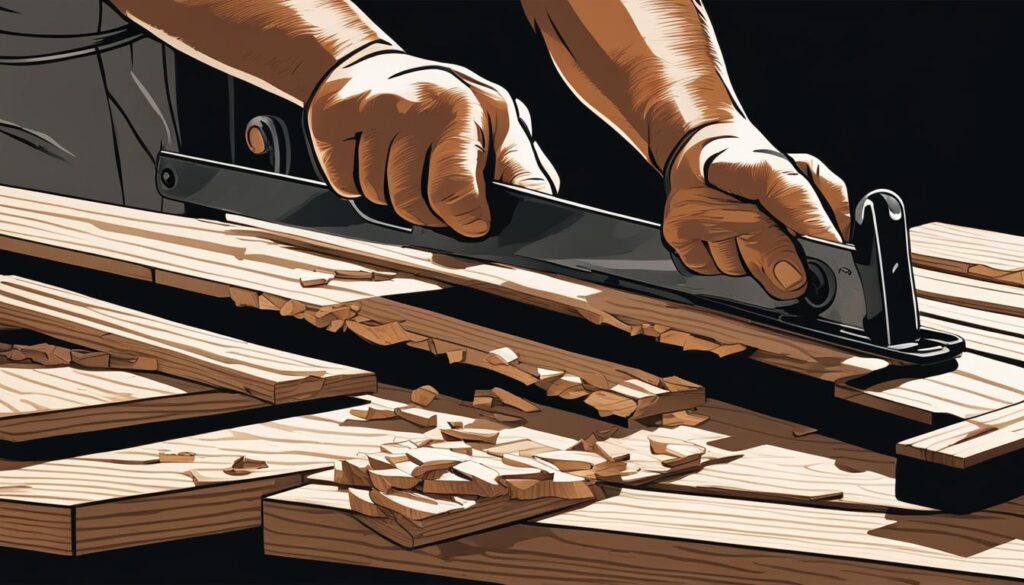We may earn money or products from the companies mentioned in this post.
Woodworking is an art form that requires precision, creativity, and patience. Whether you’re a beginner or an experienced woodworker, there is always room for improvement. One of the best ways to enhance your woodworking skills and knowledge is through woodworking education and courses. These programs provide hands-on learning experiences and expert guidance to help you become a master craftsman in creating beautiful creations with wood.
Woodworking education and courses cover a wide range of topics, from basic techniques and safety protocols to more advanced design principles and tool usage. These programs offer a structured curriculum and flexible learning options to fit your individual needs and goals. Whether you prefer in-person classes or online courses, there are plenty of options available to help you take your woodworking skills to the next level.
Key Takeaways:
- Woodworking education and courses are essential for anyone passionate about woodworking.
- These programs provide hands-on learning experiences and expert guidance to help you become a master craftsman in creating beautiful creations with wood.
- Woodworking education and courses cover a wide range of topics and offer flexible learning options to fit your individual needs and goals.
- Whether you prefer in-person classes or online courses, there are plenty of options available to help you take your woodworking skills to the next level.
- By investing in woodworking education, you can enhance your craftsmanship, boost your confidence, and open doors to exciting opportunities in the field.
Woodworking Classes and Workshops
Woodworking classes and workshops are an excellent way to gain hands-on experience and enhance your skills in this craft. Whether you’re a beginner or an experienced woodworker, these programs offer a structured learning environment that can help you achieve your goals. From basic tool safety to advanced joinery techniques, these classes and workshops cover all aspects of woodworking.
Types of Woodworking Classes and Workshops
There are various types of woodworking classes and workshops available, such as:
- Basic woodworking classes for beginners
- Advanced woodworking classes for experienced woodworkers
- Cabinet making classes
- Furniture making classes
- Woodturning classes
- Box making classes
Each of these classes has its unique curriculum and focuses on specific skills and techniques. Depending on your interests and skill level, you can choose the class that suits you best.
Benefits of Woodworking Classes and Workshops
The benefits of attending woodworking classes and workshops include:
- Hands-on learning experience
- Expert guidance and feedback
- Structured curriculum
- Access to specialized tools and equipment
- Opportunities to connect with other woodworking enthusiasts
- Exposure to different woodworking styles and techniques
By attending these classes and workshops, you can improve your woodworking skills, learn new techniques, and gain confidence in your abilities.
“Attending woodworking classes and workshops helped me improve my skills and become more confident as a woodworker. The expert guidance and feedback I received were invaluable, and I also made some great connections with other woodworking enthusiasts.”
Whether you’re looking to pursue woodworking as a hobby or a profession, attending classes and workshops is an excellent way to gain knowledge, skills, and experience. So why not enroll in a class today and take your woodworking skills to the next level?
Woodworking Schools and Training Programs
Woodworking schools and training programs are ideal for enthusiasts and professionals looking for in-depth knowledge and hands-on experience in carpentry. These programs offer structured courses and expert guidance on various woodworking techniques, tool usage, safety protocols, and design principles.
The courses offered by woodworking schools vary depending on the level of proficiency of the students. Beginners can take introductory courses on basic woodworking skills such as sawing, drilling, and sanding. Advanced students can opt for specialized courses such as furniture making, cabinet making, or woodturning.
Woodworking Training
Woodworking training is an essential part of any woodworking program. This training teaches students how to use different woodworking tools and machines safely and effectively. It also provides students with the knowledge and skills needed to read and interpret woodworking plans and blueprints.
Some of the common tools used in woodworking training include saws, routers, planers, and sanders. Proper use of these tools is crucial to ensure the safety of the woodworker and the quality of the finished product.
Carpentry Education
Carpentry education is an integral part of woodworking schools and programs. This education covers the fundamentals of carpentry, including the different types of wood, joinery techniques, and finishing methods.
Carpentry education also includes instruction on basic construction techniques, such as framing, roofing, and insulation. Students learn how to read and interpret blueprints and building codes, and how to use different hand and power tools in construction projects.
Woodworking Programs
Woodworking programs offer comprehensive training and education in all aspects of woodworking. These programs typically last one to two years and lead to a certificate or a degree in woodworking.
Students in woodworking programs learn not only woodworking techniques but also how to market themselves and their skills to potential clients. They also learn how to set up their own woodworking business and manage their finances.
Woodworking Certification and Apprenticeships
Woodworking certification programs and apprenticeships are excellent ways to advance your woodworking career and gain recognition for your skills.
Woodworking certification: Certification programs are designed to validate your proficiency in specific areas of woodworking. These programs typically require you to demonstrate your skills and knowledge through a series of tests and assessments. Upon successful completion, you’ll receive a certificate that recognizes your expertise in the field. Some of the benefits of earning woodworking certification include:
- Enhanced credibility and marketability
- Recognition for your skills and knowledge
- Increased earning potential
Woodworking apprenticeships: Apprenticeships offer hands-on training under the guidance of experienced professionals. These programs typically last two to four years and involve both classroom instruction and on-the-job training. As an apprentice, you’ll work alongside master craftsmen and learn the skills and techniques necessary to become a skilled woodworker. Some of the benefits of participating in a woodworking apprenticeship include:
- Hands-on training and mentorship from experienced professionals
- Opportunities to learn new techniques and refine existing skills
- Networking with other professionals in the field
Whether you choose to pursue woodworking certification or participate in an apprenticeship program, these opportunities are sure to enhance your skills and take your woodworking career to the next level.
Advantages of Woodworking Education and Courses
Woodworking education and carpentry courses offer a range of benefits for aspiring woodworkers. Below are some of the main advantages:
Enhanced Craftsmanship
Woodworking education can help you master various techniques and skills, from basic joinery to advanced carving and cabinetmaking. By learning from expert instructors and practicing hands-on, you can refine your craftsmanship and take your woodworking projects to the next level.
Expanded Knowledge
Woodworking courses provide a comprehensive understanding of woodworking materials, tools, and techniques. You’ll learn about different types of wood and their properties, various hand and power tools, and techniques for shaping, cutting, and finishing wood. This knowledge can help you make more informed decisions in your future projects and expand your creativity.
Networking Opportunities
Woodworking courses bring together individuals with a shared passion for woodworking, creating a community of learners and enthusiasts. By attending workshops and classes, you can meet fellow woodworkers, exchange ideas and tips, and establish valuable connections in the industry. This networking can lead to new opportunities and collaborations in the field.
Career Advancement
Woodworking education and training can lead to career advancement opportunities in the field of carpentry. Whether you’re looking to start your own woodworking business or work for an established company, having certification or credentials can help you stand out in a competitive job market. Additionally, taking carpentry courses can help you gain the skills and knowledge needed to pursue a specialized career path.
Increased Confidence
As you gain more knowledge and experience through woodworking education, your confidence in your abilities will grow. This enhanced self-assurance can lead to a sense of pride in your work and inspire you to take on more ambitious woodworking projects.
Conclusion
Woodworking education and courses provide a gateway to becoming a master craftsman in creating beautiful creations with wood. Whether you’re a beginner or an experienced woodworker, these programs offer valuable knowledge and practical skills that can elevate your craft.
By enrolling in woodworking classes and workshops, you can develop hands-on learning experiences to hone your skills and gain expert guidance to help you get started. If you’re thinking about pursuing a career as a professional woodworker, woodworking schools and training programs provide a solid foundation for your woodworking journey.
Woodworking certification programs and apprenticeships offer opportunities for recognition for your woodworking skills and expertise. Earning a certification can validate your proficiency in specific woodworking areas while participating in an apprenticeship can offer hands-on training under the guidance of experienced craftsmen.
Overall, woodworking education and courses provide numerous advantages for aspiring woodworkers. You can learn new techniques, refine existing skills, network with fellow enthusiasts and professionals, boost your confidence, and open doors to exciting opportunities in the field.
Embrace the opportunity to learn and grow in the world of woodworking and experience the satisfaction of creating beautiful creations in wood.
FAQ
What is the importance of woodworking education and courses?
Woodworking education and courses are essential in enhancing your skills and knowledge in the craft of woodworking. These programs offer structured learning opportunities that can help you become a master craftsman in creating beautiful creations with wood.
What do woodworking classes and workshops offer?
Woodworking classes and workshops provide hands-on learning experiences for individuals interested in honing their woodworking skills. These programs offer a structured curriculum and expert guidance to help beginners get started and experienced woodworkers expand their knowledge.
What can I expect from woodworking schools and training programs?
Woodworking schools and training programs offer comprehensive education in woodworking and carpentry. These programs often include courses on woodworking techniques, tool usage, safety protocols, and design principles. Whether you’re a hobbyist looking to improve your skills or aspiring to pursue a career as a professional woodworker, these schools and programs provide a solid foundation for your woodworking journey.
What are the benefits of woodworking certification and apprenticeships?
Woodworking certification programs and apprenticeships provide opportunities for individuals to gain recognition for their woodworking skills and expertise. Certification programs validate your proficiency in specific woodworking areas, while apprenticeships offer hands-on training under the guidance of experienced craftsmen.
What advantages do woodworking education and courses offer?
Woodworking education and courses offer numerous advantages for aspiring woodworkers. From learning new techniques and refining existing skills to networking with fellow enthusiasts and professionals, these programs provide a rich learning experience that can enhance your craftsmanship, boost your confidence, and open doors to exciting opportunities in the field.
Affiliate Disclosure: This post may contain affiliate links. If you purchase through our link, we may receive a small commission, but at no additional cost to you. For more information, please see our Disclosure statement.



